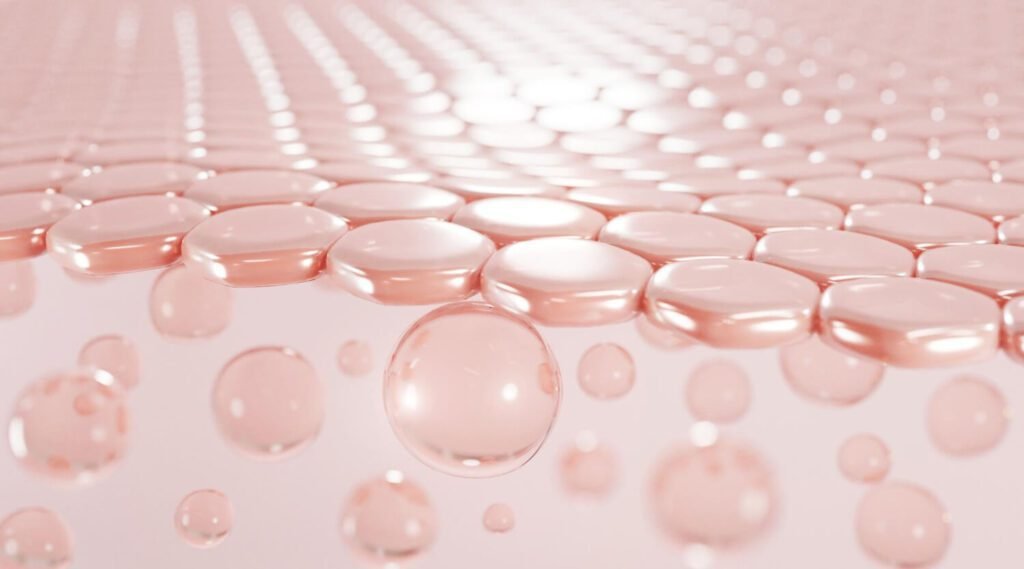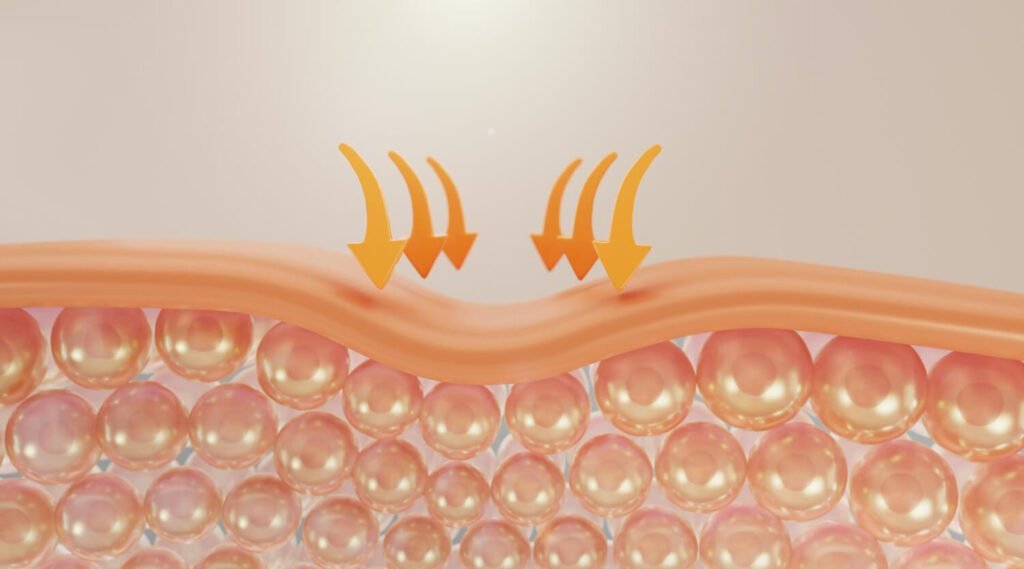Collagen is an essential protein for the firmness, elasticity and health of your skin. As you age, your natural collagen production decreases, which can cause wrinkles, sagging and loss of vitality. In this article, you will learn what collagen is for in your skin, what types there are, how to stimulate collagen production and the benefits of collagen for your skin and joints. A complete guide to maintaining a youthful and healthy appearance!
Summary
Explanatory video on the benefits of collagen for the skin:
What is collagen and why is it essential for the skin?
Collagen is a protein that is abundant in the human body, especially in tissues such as skin, cartilage, tendons and bones. It forms a structural network that supports skin cells, maintaining their elasticity, firmness and hydration.
As we age, the body's production of collagen naturally begins to decrease. This decline compromises the structure of the skin and is linked to the appearance of wrinkles, sagging skin and loss of radiance. In addition to the skin, collagen contributes to joint health, being essential for mobility and preventing pain.
What are the main types of collagen?
There are several types of collagen, but the most relevant for the health and beauty of the skin are:

Collagen type I: the most abundant in the body, representing approximately 90% of total collagen. It is present in the skin, bones and tendons, and is essential for the firmness and elasticity of the skin.
Collagen type II: found in cartilage, it is associated with joint health and mobility.
Collagen type III: complements type I, also present in the structure of the skin and blood vessels.
When choosing a collagen supplement, check the predominant type of collagen and whether it fits your goals (skin, joints, etc.).
What are the benefits of collagen for the skin?
Collagen supplementation and proper nutrition can offer several benefits for the skin:
- Improve skin firmness and reduce wrinkles
- Smooth expression lines
- Combat sagging skin
- Prevent loss of elasticity
- Help keep skin hydrated
- Improve skin texture
In addition to aesthetics, collagen also protects against external aggressions such as pollution and sun exposure, acting as a barrier to support the skin. Hydrolyzed collagen is widely used due to its easy absorption. Its effects on collagen are perceived in the medium term, as long as intake is regular.
👉 To learn more, check out our complete natural beauty guide focusing on collagen and antioxidants.
How to stimulate collagen production naturally?
You can stimulate the production of the protein naturally with healthy habits. Collagen production is favored by:
- Consumption of foods rich in collagen and vitamin C
- Avoid excessive sun exposure, which can degrade collagen fibers
- Adequate sleep and sleep control stress
- Hydration and use of sunscreen daily
Additionally, the use of antioxidants such as resveratrol, can prevent the degradation of collagen already present in the skin. A good skincare routine and habits such as avoiding smoking also help preserve the integrity of collagen fibers.
What causes collagen loss in the skin?
Collagen loss occurs for several reasons:

- Natural aging (main cause)
- Poor nutrition
- Excessive sun exposure
- Smoking and pollution
- Lack of sleep and chronic stress
These factors affect the body's production of collagen and harm the appearance of the skin. Fiber degradation can occur more quickly in people with bad habits or chronic diseases, making it even more important to adopt preventive measures.
When and how much collagen should I take per day?
The best time to take collagen can vary, but many experts recommend using on an empty stomach or before bed, as these moments favor the absorption and action of collagen peptides. However, the most important thing is to maintain the daily regularity.
The ideal dose is usually 5 to 10 grams per day, and may vary depending on each person's goals. Always consult a health professional to adjust the amount appropriate for your case.
Which ingredients enhance the effects of collagen?
Some supplements include vitamin C and hyaluronic acid in their formulas, which enhances the results. Vitamin C acts directly on the collagen synthesis, while hyaluronic acid helps maintain skin hydration and volume. Other active ingredients such as biotin and organic silicon are also welcome.
How long does it take for collagen to start working?

The effects of collagen can begin to be noticed from 4 to 6 weeks of continuous use, mainly in the hydration and texture of the skin. The benefits for nails, hair and joints can take from 2 to 3 months to appear. The secret is in consistency and quality of the supplement.
Do collagen supplements really work?
Yes, as long as they are used correctly. hydrolyzed collagen, also called collagen peptides, is more easily absorbed and can contribute to:
- Increase skin elasticity and firmness
- Reduce wrinkles
- Strengthen nails and hair
- Improve joint health
Collagen supplementation can be done in capsules or powder form. Consult a professional before starting to use it, especially if you have any health conditions. For best results, combine it with a balanced diet rich in antioxidants.
What foods help produce collagen?
Some foods are rich in or promote the formation of collagen in the body:

- Animal bone broth (rich in collagen protein)
- Meat and fish
- Citrus fruits (vitamin C)
- Dark green vegetables (antioxidants)
- Seeds and nuts (zinc and copper)
These nutrients are essential for stimulating collagen production and maintaining adequate collagen levels. A rich and varied diet is the basis for the body to have the necessary resources to produce collagen naturally.
What types of collagen are in supplements?
In addition to type I and II collagen, there are different forms in which the supplement can be presented:
- Hydrolyzed collagen: easier to absorb, ideal for firm skin
- Non-hydrolyzed collagen: less absorbed, often used in cosmetics
- Collagen in capsules: practical, but requires good formulation
Some products include vitamin C, hyaluronic acid and organic silicon to enhance collagen stimulation. There are also collagens that focus on joints, skin, hair or nails.
Does collagen help joints?
Yes, type II collagen is present in cartilage and helps regenerate joint tissue. Its intake can:

- Reduce joint pain
- Improve mobility
- Preventing wear and tear in sports practitioners
Studies show that regular use of type II collagen can reduce joint inflammation and improve lubrication between bones. This is especially beneficial for people with arthritis, the elderly, and athletes.
The combination of type II collagen, vitamin D and calcium is ideal for bones and cartilage. It is possible to find supplements with this specific formula aimed at joint support.
Is it safe to take collagen every day?
Taking collagen every day is safe for most people, as long as the recommended dose is followed (generally between 5 and 10 g of collagen per day).
Collagen supplementation is considered safe, but it is important to check the origin of the product and seek guidance from a professional. People with food allergies, kidney problems or who are taking specific medications should consult their doctor before starting.
Key Points to Remember
- Collagen is an essential protein for skin firmness and elasticity
- Collagen production decreases with age, but can be stimulated
- There are several types of collagen, each with a specific function.
- Hydrolyzed collagen is better absorbed
- Foods rich in collagen and vitamin C help in natural production
- Supplements with type I and II collagen have great effects on the skin and joints
- Maintaining healthy habits prevents the degradation of collagen already present
- Hyaluronic acid and vitamin C enhance the effects of supplementation
- Results appear with continuous use, from 4 to 6 weeks
Frequently Asked Questions About Collagen in Skin
What is the best collagen for firm skin?
Hydrolyzed collagen type I is the most recommended for those seeking firm and elastic skin. It has high absorption and can be enhanced with vitamin C.
Does collagen really help reduce wrinkles?
Yes! Continuous consumption of collagen for the skin is associated with reducing wrinkles and improving skin firmness, as well as leaving the skin looking youthful.
Can I take collagen with other supplements?
Yes, especially with vitamin C, hyaluronic acid and biotin, which help in the production of collagen and maintaining skin health.
Is there a difference between natural and industrial collagen?
Natural collagen comes from foods (such as bones and meat), while industrial collagen is obtained from animal sources and processed to make it easier to absorb. Both can be useful.
Can collagen loss be reversed?
It is possible to stimulate collagen production and prevent collagen degradation with proper nutrition, supplements and skin care.



